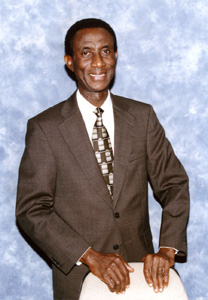On the night of June 28, 2007, a gang of armed men in dark clothes and sunglasses forced their way into Roko Frimpong's house in the port city of Tema in southeastern Ghana. They found Frimpong, a longtime banker in the developing world, on the balcony, ironing, and ordered him to go outside. There, they shot him at close range, execution-style. Frimpong, fifty-four, died on the way to the hospital.

Frimpong grew up in Ghana, but came to the United States for college, first attending Whittier College in southern California and then transferring to Brown. He earned an AB in economics and went on to get a master's in economics from Tufts. In 1982 he moved his family to Haiti, where he worked as a loan officer for First National Bank of Boston. This was also the year he changed his name from Richard to Roko, which had been his childhood nickname in Ghana.
Millicent Frimpong, his wife, says her husband strove to strengthen financial institutions in the Third World. "He loved his job as a banker," Millicent says. "He did everything 100 percent." In the program for Frimpong's memorial service in Ghana last August, his driver Yusif Hamid wrote, "Three and a half years did I work with my boss and I understood his principles and philosophy that in life one ought to give each and everyone who comes one's way equal attention and assistance without discrimination."
Frimpong spent eighteen years in Haiti, working his way up the ranks to become general manager of Banque Intercontinentale, which purchased First Boston's branches in Haiti. In 2000, Frimpong's wife and three daughters moved to Florida while he returned to Ghana to work as a risk- management consultant for SG-SSB Bank, one of the largest banks in the country. Several years later he took a job with Ghana Commercial Bank as deputy managing director of operations, the position he held at the time of his death. He is credited with the nationwide computerization of the institution. According to Millicent Frimpong, her husband wanted to retire in Ghana. She planned to join him there after their daughters grew older. "Home is home," Millicent Frimpong says. "He always thought he would return to Ghana one day."
Thousands of mourners, including many politicians and senior bank officials, attended Frimpong's memorial service. "Roko, my beloved husband and lifelong friend, we shared so many wonderful and glorious years together," Millicent Frimpong said at the ceremony, "until our fairytale relationship crashed around my ears on that doomed and gloomy day." The two were high school sweethearts.
No trial date has been set for the men accused of Frimpong's murder, and police have indicated that one or two suspects are still at large. This summer, the family will travel to Ghana to finish the customary funeral rites for Frimpong. They also hope the authorities will be able to give them additional details about the murder. "I hope one day they will find out what happened," Yaa, the second of the three daughters, says. "But for now, it's best not to focus on information we can't get. We're just trying to move on."





